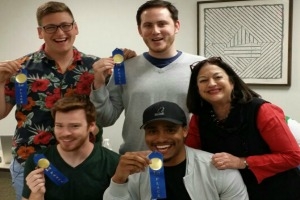Business
From Beer to Business
Kogod Professor Judith Spector hosted the first annual Beer Madness Competition this Spring

The winning team of the Beer Madness Competition enjoy their victory with Professor Spector.
For AU Professor Judith Spector, beer is not just a beverage. It’s a teaching mechanism. "The beer industry is an ideal outlet for learning the complexities of the business world," she says. "It fits perfectly into the market and financial analysis skills I teach in my courses."
Spector, who teaches business policy and strategy at Kogod, also strongly believes in integrating the real world into the classroom. By applying academic concepts to areas of commerce such as the beer business, students bridge what they've learned in class to real life. "It's important for students to know how to apply what they've learned to actual business," Spector says.
On April 6, 2016, Spector put these philosophies to action by hosting Kogod's first annual Beer Madness Competition. Modeled after Kogod’s annual school-wide Case Competition, Beer Madness challenged student groups to present strategic recommendations for problems various beer companies faced. Teams analyzed different cases, and were given one week to prepare for the competition.
For Jiaqui Li, BSBA '16, participating in Beer Madness was valuable for a number of reasons. Preparing and engaging in the competition challenged her to be an “active, contributing member of the team,” and gave her the chance to “practice communicating research to an audience.”
“Presenting is a vital part of the business world,” Li explains. “The Beer Madness Competition offered a way to develop the skills I need to be successful in my future career.”
Presentations lasted fifteen minutes and were judged by a panel of beer industry professionals, who also conducted a question and answer session with each team. Judges included a former beverage purchaser for Clydes; the owner of the recently established Seven Locks Brewery in Rockville, MD; and David Bell, of the nationally-renowned Bell’s Brewery in Michigan. “Their major responsibility was to ask the tough questions, which added value by challenging students,” Spector says. “Presentations aren’t just something you rehearse. You’ve got to be on your toes.”
The benefits of participating in Beer Madness extended well beyond the competition itself. In order to succeed, students needed to analyze a problem, conduct research, and make informed decisions—all skills strong business leaders must possess. “This experience helped students internalize concepts so they can become more comfortable and natural in their strategic decision-making,” says Spector. “It challenged them to think at a higher, more complex level.”
Integrating the Beer Madness Competition into her Business Policy and Strategy class curriculum also gave Spector the opportunity to nurture a skill essential for any business professional: confident public speaking.
Knowing many were often not comfortable asserting themselves in class, Spector asked students to meet individually with her at the beginning of the semester. She discussed each student’s thoughts, plans and interests, with the goal of empowering students to express themselves. Spector found that this easily transferred to class discussions, and to student teams when preparing for the competition.
“This course provided an atmosphere that made me feel comfortable expressing myself,” Li says. “I used to feel stressed and embarrassed participating in class discussions, but Professor Spector cultivated a kind and easy-going environment.”
Spector hopes participating in Beer Madness helped instill a sense of confidence—and levity—in students. “As a teacher, it is one of my main goals to help students feel good about themselves if they’ve worked hard,” Spector says. “The competition was serious, but it was also fun. I think it helped the semester end on a high note.”
More than anything, she hopes students learned from the competition, from her class, and from each other. Though, she notes, “I probably learned the most.”

